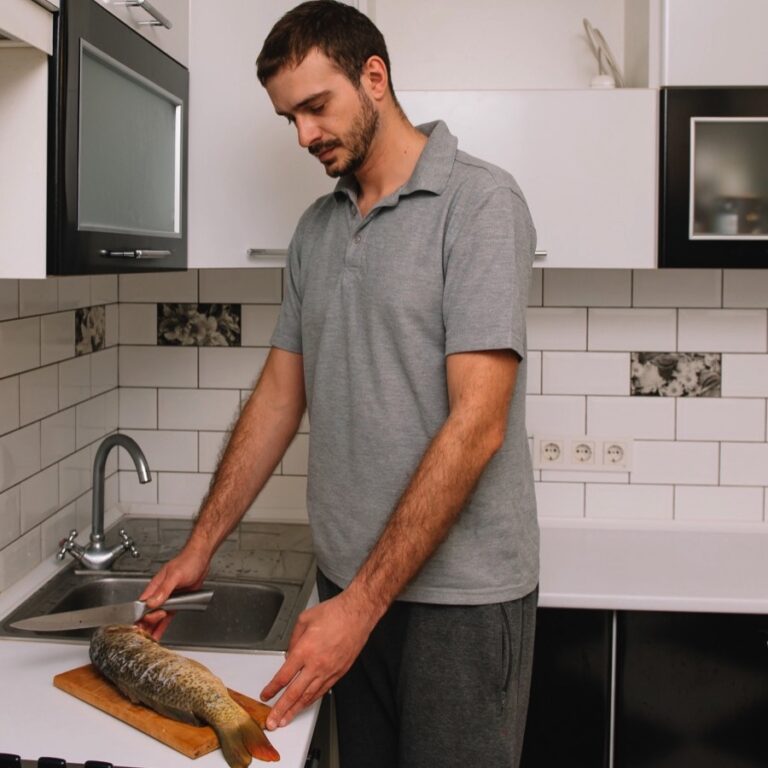1
00:00:03,153 –> 00:00:06,166
Joana: Ó Marcelo, ouvi dizer que foste despedido outra vez?
{{Joana: Hey Marcelo, I heard you were fired again?}}
2
00:00:06,792 –> 00:00:09,410
Marcelo: Eh pá… Nem me fales disso.
{{Marcelo: Oh man… don’t even talk to me about that.}}
3
00:00:09,834 –> 00:00:10,816
Joana: O que é que aconteceu?
{{Joana: What happened?}}
4
00:00:11,225 –> 00:00:15,657
Marcelo: O meu patrão despediu-me porque disse que eu fazia o escritório cheirar mal.
{{Marcelo: My boss fired me because he said I was making the office smell bad.}}
5
00:00:16,132 –> 00:00:18,305
Joana: Ai… O que é que tu fizeste?
{{Joana: Oh… what did you do?}}
6
00:00:18,595 –> 00:00:19,994
Marcelo: Fiz dourada no forno.
{{Marcelo: I made golden bream (fish) in the oven.}}
7
00:00:20,460 –> 00:00:26,048
O escritório tem uma cozinha e eu queria ser simpático e fazer almoço para toda a gente.
{{The office has a kitchen and I wanted to be nice and make lunch for everyone.}}
8
00:00:26,536 –> 00:00:32,662
Joana: E vais fazer dourada no meio de um escritório minúsculo com dezenas de pessoas? És tão cromo!
{{Joana: And you’re going to make golden bream in the middle of a tiny office with dozens of people? You are such a fool!}}
9
00:00:32,901 –> 00:00:38,271
Marcelo: Vários estudos demonstram que comer peixe aumenta a esperança média de vida.
{{Marcelo: Several studies show that eating fish increases the average life expectancy.}}
10
00:00:38,725 –> 00:00:40,750
Joana: Tu se não nascesses tinhas de ser inventado.
{{Joana: If you weren’t born you would have to be invented. (i.e. you’re unusual)}}
11
00:00:41,288 –> 00:00:44,331
Marcelo: Mas achas justo despedirem-me por isso?
{{Marcelo: But do you think it’s fair for me to be fired for that?}}
12
00:00:44,800 –> 00:00:47,410
Joana: Vá, sê lá sincero, não foi só isso que fizeste.
{{Joana: Come on, be honest, that’s not all you did.}}
13
00:00:47,926 –> 00:00:56,300
Marcelo: Ok… É possível que eu tenha feito lulas no dia anterior. E antes disso fritei carapaus.
{{Marcelo: Okay… It’s possible that I had made squid the day before. And before that I fried horse mackerel (fish).}}
14
00:00:56,805 –> 00:01:01,275
Joana: Tu saíste-me cá uma peça! Isso é um escritório, não é um refeitório!
{{Joana: You are a real piece of work! This is an office, not a cafeteria!}}
15
00:01:01,616 –> 00:01:06,258
Estavas à espera de quê? Já para não falar que carapaus são tão melhores grelhados.
{{What did you expect? Not to mention, horse mackerel is so much better grilled.}}
16
00:01:06,742 –> 00:01:11,225
Marcelo: Estava à espera que os meus esforços culinários fossem apreciados…
{{Marcelo: I was hoping my culinary efforts would be appreciated…}}
17
00:01:11,767 –> 00:01:16,616
O que é que vou fazer para arranjar emprego? Isto não está nada fácil.
{{What am I going to do to get a job? This is not easy at all.}}
18
00:01:17,080 –> 00:01:18,212
Joana: Olha, faz-te à vida.
{{Joana: Look, just get on with your life.)}}
19
00:01:18,577 –> 00:01:20,263
Marcelo: Grande ajuda que tu és!
{{Marcelo: What a big help you are!}}
20
00:01:20,752 –> 00:01:24,893
Joana: Alguma coisa se vai arranjar. Só tens de puxar por essa cabecinha por uma vez na vida.
{{Joana: Something will come up. You just have to use your brain (“pull on that little head”) for once in your life.}}
21
00:01:25,285 –> 00:01:28,383
Marcelo: Se calhar podia arranjar trabalho como cozinheiro…
{{Marcelo: Maybe I could get a job as a cook…}}
22
00:01:28,751 –> 00:01:30,392
Joana: Só se for numa marisqueira.
{{Joana: Only if it’s in a seafood restaurant.}}
23
00:01:30,771 –> 00:01:33,385
Marcelo: Peixe não é marisco, sua sonsa.
{{Marcelo: Fish is not seafood, you jerk.}}
24
00:01:33,824 –> 00:01:36,736
Joana: Olhem-me só o conhecimento culinário deste marmelo!
{{Joana: Look at the culinary knowledge of this muppet (“quince”)!}}
25
00:01:37,081 –> 00:01:40,323
Marcelo: Melhor que o teu, que nem sabes estrelar um ovo.
{{Marcelo: Better than yours, you can’t even fry an egg.}}
26
00:01:40,715 –> 00:01:45,349
Joana: É verdade, mas olha que também não me passaria pela cabeça ir estrelar ovos para o escritório…
{{Joana: That’s true, but then again, it wouldn’t have crossed my mind to go fry eggs in the office…}}

 Eliana
Eliana Rui
Rui











Am I right to assume that advancing levels (A -> C), rather than introducing more vocabulary and advanced grammar, boils down to swallowing ever more syllables? Intelligibility of the spoken language seems to be a matter of national pride. ¯\_(ツ)_/¯
Maybe it was a rhetorical question, but moving from A level to C level includes lots of vocabulary and grammar, too. 🙃 But yes, European Portuguese has many “closed” vowels, and unstressed syllables are weak, so this is what makes it sound like it’s being swallowed. This video discusses some of the patterns Mystery of the Disappearing Sounds (in European Portuguese!) and you can find more pronunciation resources here: Pronunciation – Site Index. Ultimately it comes down to lots and lots of listening practice to get more comfortable with understanding and producing the spoken language.
Just wanted to say thanks for this one. I’m at a point where I need lots of idioms/expressions and slang in order to improve listening comprehension, and this dialog delivers.